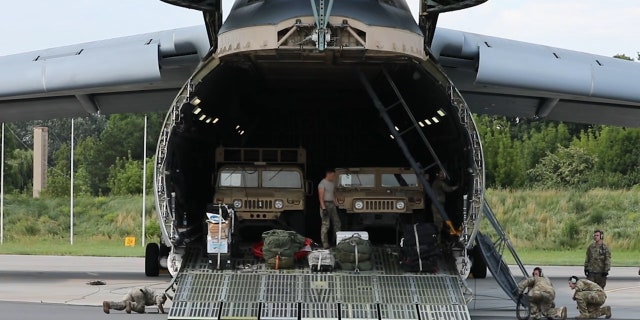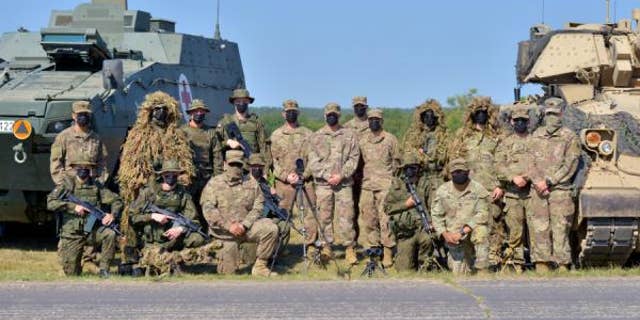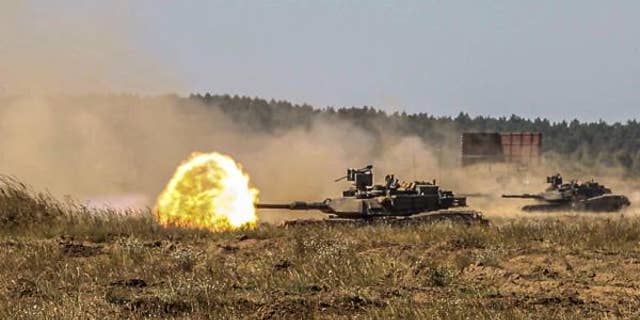Home » World News »
A look at COVID-19 precautions inside U.S. Army 1st Cavalry Division

Before leaving for Poland, members of the 2nd Battalion, 12th Cavalry Regiment, 1st Armored Brigade Combat Team, 1st Cavalry Division were tested for COVID-19.
“They called it a restriction of movement so we were monitored and screened regularly throughout the process multiple times a day to make sure people were not symptomatic or feeling ill,” Lt. Col. Ronald Sprang said. “We are still undergoing random testing, so we are testing 10% of the population on a regular basis and as it stands right now, we don’t have anybody with COVID.”
The 2nd Battalion, the 12th Cavalry Regiment, the 1st Armored Brigade Combat Team and the 1st Cavalry Division also had to quarantine upon arrival in Poland and had to test negative for COVID before moving into the training exercise.
“We then control who we encounter to make sure we don’t get within 6 feet of anyone that is not part of our known negative population,” Sprang said.
The military is also using “bubbles” both home and abroad, meaning soldiers are only interacting with those who have tested negative for COVID.
“We know our bubble, the individuals that have been tested, we can interact with them normally, but once we are outside of that bubble, and dealing with other units or the Polish, we automatically mask up,” Sgt. Maj. Hipolito Rodriguez said.

Soldiers are required to wear a mask when they are around anyone that has not recently tested negative for COVID-19.
In Texas, troopers are practicing COVID-19 procedures during a weeklong Command Post training exercise on post.
“It has just caused us to be a little more deliberate in our process,” 1st Cavalry Division commanding Gen. Jeff Broadwater said. “They start with a temperature check and if that’s normal then they answer a few questions, and then they move in and start their normal day of training.”
Soldiers also are practicing social distancing as often as possible, wearing masks and disinfecting training areas throughout the day.
The 115th Brigade Support Batallion, which also has soldiers in Poland, just returned from a weeklong deployment at Fort Hood. The batallion is taking similar precautions.
“We do food, fuel, water, repair parts, and we also have a hospital and a full maintenance bay,” Lt. Col. Stacy Moore said. “We all wear our masks, we screen as we come in and out of our work spaces and we also ask question about whether they have come in contact with someone who may have been COVID positive.”
Soldiers who have a temperature around 100 degrees have to take extra precautions before being allowed to work.
“We want to make sure that we are doing things that protect ourselves, our families, our communities and of course the people we live and work with every day,” Moore said. “We have not had many folks that have screened in a way that is of concern in our motor pool.”
DOWNLOAD THE FOX NEWS APP HERE
Sgt. Makenzie Garcia is a vehicle mechanic in the 115th Brigade Support Battalion. The soldier said catching COVID isn't a concern because of the protocols in place.
“Every day when we come in the motor pool, we are screened and we all have to use hand sanitizer and wear gloves at all times,” Garcia said. “We have done so many precautionary measures to make sure all the soldiers and ourselves are safe.”
The brigade typically washes vehicles when they come back from the field and is also wiping down their insides to help protect against COVID-19.
Broadwater said as the pandemic goes on, they will continue to follow guidance from post leadership as well as the Army and the Centers for Disease Control and Prevention.
“That’s what we have to do, If our nation calls us, we have to be ready to go,” Broadwater said.

Troopers who are currently deployed to Poland are expected to be back at Fort Hood by September.
Broadwater also said he is grateful for family support during the pandemic, adding it has helped the soldiers stay combat ready.
“The mask I have was made by one of our soldiers mothers, my wife has made a lot of masks and there have been a lot of folks that have stepped forward and helped in anyway they can,” he said.
During the pandemic, commanders also have ordered soldiers to avoid areas deemed COVID-19 hot spots by post leadership.
Source: Read Full Article


